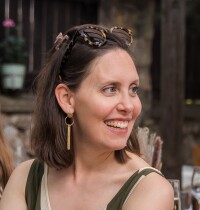Waitukaitis Group
Soft Electrified Materials
Scott Waitukaitis leads an experimental soft matter physics lab. The group focuses on complex phenomena that emerge when everyday materials interact with electric fields.
One major focus is contact electrification of insulators, i.e. the exchange of electrical charge between materials when they touch. Although known to occur even in ancient Greece, the underlying mechanism remains poorly understood. In our lab, we have found that contact electrification seems to have different causes depending on the type of material used. For soft organic materials such as plastics, our work points to irreversible nanoscale mechanical deformations as a key ingredient, potentially through the release of charge through mechanochemical and flexoelectric effects. For oxide insulators, i.e., hard inorganic materials like glass or ceramic, we find that surface adsorbates (e.g. nanoscopic layers of water and hydrocarbons) play a critical role.
Other interests of the group include creating emergent activity with electrical energy injection (e.g. Quincke rollers or charged matter in acoustic levitation), the physics of lightning, the development of charge-measurement techniques, and the Leidenfrost effect.
Team
Current Projects
Triboelectric series of identical insulators | Contact electrification of oxides | The elastic Leidenfrost Effect | Anisotropic active matter | Measuring charge of aerosols | KPFM of insulator surfaces | Ionomer-induced charge exchange | Emergent activity of acoustically levitated charged matter
Publications
Shi S, Hübl M, Grosjean GM, Goodrich CP, Waitukaitis SR. 2025. Electrostatics overcome acoustic collapse to assemble, adapt, and activate levitated matter. Proceedings of the National Academy of Sciences of the United States of America. 122(50), e2516865122. View
Stöllner A, Lenton IC, Volosniev A, Millen J, Shibuya R, Ishii H, Rak D, Alpichshev Z, David G, Signorell R, Muller CJ, Waitukaitis SR. 2025. Using optical tweezers to simultaneously trap, charge, and measure the charge of a microparticle in air. Physical Review Letters. 135(21), 218202. View
Shi S. 2025. Datasets and code for manuscript ‘Electrostatics overcome acoustic collapse to assemble, adapt, and activate levitated matter’, Zenodo, 10.5281/ZENODO.15752991. View
Pertl F, Lenton IC, Cramer T, Waitukaitis SR. 2025. No time for surface charge: How bulk conductivity hides charge patterns from Kelvin probe force microscopy in contact-electrified surfaces. Physical Review Letters. 135(14), 146202. View
Lenton IC, Pertl F, Shafeek LB, Waitukaitis SR. 2025. A duality between surface charge and work function in scanning Kelvin probe microscopy. Advanced Materials Interfaces. View
ReX-Link: Scott Waitukaitis
Career
Since 2019 Assistant Professor, Institute of Science and Technology Austria (ISTA)
2016-2018 Veni Fellow and postdoctoral scholar at AMOLF, Amsterdam, the Netherlands
2013-2016 Postdoctoral Scholar at Leiden University, Leiden, the Netherlands
2007-2013 Ph.D. in physics at the University of Chicago, Chicago USA
Selected Distinctions
2021 Member of the Young Academy (Austria)
2020 ERC Starting Grant
2018 NNV Fysica Young Speakers Award
2018 Block Prize for Outstanding Young Researcher
2016-present Veni Research Grant from the Netherlands Organization for Scientific Research
2014 The Springer Thesis Award, Springer Publishing
2012 The Bruce Winstein Prize for Instrumentation
2010-2013 Robert A. Millikan Fellowship
Additional Information
Download CV
Waitukaitis Group website
Physics & Beyond at ISTA











